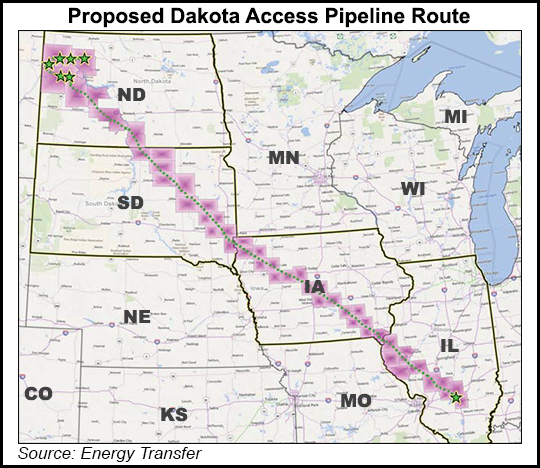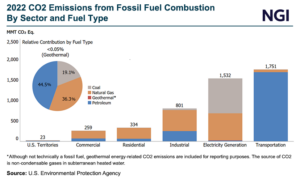Infrastructure | NGI All News Access | NGI The Weekly Gas Market Report
Energy Transfer Not Yet Shutting Down Dakota Access Crude Pipeline as it Renews Stay Request
Energy Transfer LP has “not yet taken any steps to begin shutting down” the Dakota Access pipeline (DAPL) in light of an order by the U.S. District Court for the District of Columbia to temporarily halt operations and empty the 1,172-mile crude oil pipeline while an environmental impact statement (EIS) is completed.

Instead, lawyers for the Dallas-based operator late Wednesday filed a motion for stay pending appeal of the U.S. District Court for the District of Columbia’s July 6 ruling to vacate the project’s authorizations and cease operation by Aug. 5 to the U.S. Court of Appeals for the D.C. Circuit. DAPL’s motion requests a status conference on July 9 and action on its motion by July 14.
In his ruling earlier this week, U.S. District Court Judge James Boasberg said the U.S. Army Corps of Engineers violated the National Environmental Policy Act when it granted an easement to Dakota Access LLC to construct and operate a segment of the 570,000 b/d crude oil pipeline running beneath Lake Oahe without completing an EIS. The court vacated the permits for the pipeline to cross under the lake via a right-of-way administered by the Corps.
In a statement emailed to NGI’s Shale Daily, Energy Transfer spokeswoman Lisa Coleman said the company believes “Judge Boasberg exceeded his authority and does not have the jurisdiction to shut down the pipeline or stop the flow of crude oil. Additionally, we are accepting nominations from our shippers for August.”
DAPL’s motion notes that the Native American Tribes led by the Standing Rock Sioux oppose the motion and that the Corps “reserves its position.”
In a note to clients on Wednesday, ClearView Energy Partners LLC said that it would be surprised if the Corps does not back DAPL’s motion for a stay, however, it has not indicated that it will, nor has it yet indicated it plans to file its own appeal.
As of late Wednesday, the docket did not reflect an order from Boasberg scheduling a status conference tomorrow nor any other action, according to ClearView. Furthermore, neither the Tribes nor the Corps had filed responses.
“We do not expect Judge Boasberg to change his mind on the vacatur of the permits, but next steps aren’t fully clear in terms of timing or substance,” said ClearView. “Given the high profile of the case, we believe that Judge Boasberg would have expected Dakota Access to oppose his ruling and seek an appeal and likely a stay.”
Meanwhile, producers in North Dakota’s Bakken Shale were starting to prepare for life without DAPL. The immediate challenges are how to move up to 300,000 b/d to Gulf Coast refineries, and longer term up to 500,000 b/d.
Ron Ness, president of the North Dakota Producers Council, called the federal district order “judicial overreach” and warned it would have profound economic and safety impacts. Gov. Doug Burgum said he expects the decision to be appealed given the “devastating effects” he sees for the state’s economy and the nation’s energy security.
If a single judge can shut down a pipeline that has been running safely for more than three years, Burgum said, then it could have a “chilling effect on America’s ability to build, modernize and improve our critical infrastructure.”
© 2024 Natural Gas Intelligence. All rights reserved.
ISSN © 2577-9877 | ISSN © 1532-1266 | ISSN © 2158-8023 |


